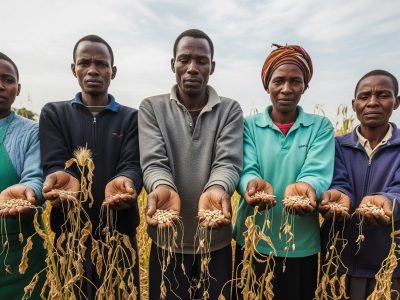Farmers & GMO Seeds: Protecting Africa’s Heritage

African smallholder farmers are being offered terminator seeds by agricultural aid agencies (Imagined by Gemini AI)
Farmers, Let’s Talk About Your Seeds
My dear farmers, listen closely. Your land, your hard work, and the seeds you’ve saved for generations are precious. They’ve fed our families, our villages, and our nations for a very long time. This is our heritage, our strength.
Now, you might be hearing about new, special seeds. These are often called “GMO” seeds. Big companies, like Monsanto (now part of Bayer), make them. And big organizations, often from far-off lands, are helping to bring them to you. They say these seeds will give you bigger harvests and solve all your problems. But we need to talk about what this means for you.
GMO seeds are changed in a laboratory. They’re made to do specific things, like resist certain bugs or survive when you spray them with a special weed killer called glyphosate (you might know it as Roundup). Sounds good, right? Less work, more food. But here’s the important part: these seeds are not like your own. You can’t usually save them to plant next year. You have to buy new seeds every single season. Think about that: every single year, you pay. This can quickly drain your pockets and trap you in a cycle of debt.
Here is something to make you think. These same products, especially the weed killers that go with GMO seeds, are treated very carefully in places like Europe. In fact, in Europe, Monsanto’s lobbyists were kicked out of their parliament a few years ago. Why? Because there were big questions about whether Monsanto played fair when testing their products, especially glyphosate, for safety.
Even though these European countries are very cautious about these products at home, some of their organizations and big foreign donors, like the Bill & Melinda Gates Foundation or USAID, are helping to spread these very same seeds and chemicals here in Africa. They offer aid, but sometimes, that aid comes with these seeds and their rules. It makes you wonder, doesn’t it? If it’s risky for them, why is it good for us?
The biggest worry for us is what happens when these GMO seeds mix with your traditional ones. The wind carries pollen. Birds carry seeds. What if a GMO maize plant grows near your special local maize? Their genes can mix. This is called “cross-pollination.” When this happens, your traditional seeds can become “contaminated” with the GMO genes. Why is this bad?
Losing Your Own Seeds:
Over time, your old, strong, local varieties could disappear. These are the seeds that know our soil, our weather, and our pests. Losing them means losing a part of our heritage and our future food security.
Legal Troubles:
The companies that make GMO seeds hold patents. That means they own the special genes. If their genes accidentally get into your crops, they could even claim you are using their patented product without paying! This has happened to farmers in other parts of the world. It’s a heavy burden to carry.
Expensive Farming:
If your fields get contaminated, you might be forced to buy more and more of their special seeds and chemicals. Your farming costs go up. Your profit shrinks. It becomes harder to make ends meet.
A Call to Our Leaders at the African Union
Our leaders at the African Union (AU) need to pay close attention. We, the farmers, are the backbone of this continent’s food. We urge the AU to truly look into these issues. They must protect our traditional seeds: Put strong rules in place to stop GMOs from mixing with our precious local crops. They must also listen to Farmers: Hear our voices. We know our land. We know what works for us. Our farming practices have kept us alive for generations. Our leaders must also ensure fair play; Make sure that any aid that comes to Africa does not push us into debt or force us to use products that are questioned elsewhere.
My brothers and sisters, think carefully. Your seeds are your freedom. Don’t let big promises overshadow the wisdom of our ancestors and the future of our children. Let’s make sure our continent remains rich in its unique plants, controlled by our own hands. Our food, our future, depends on it.
